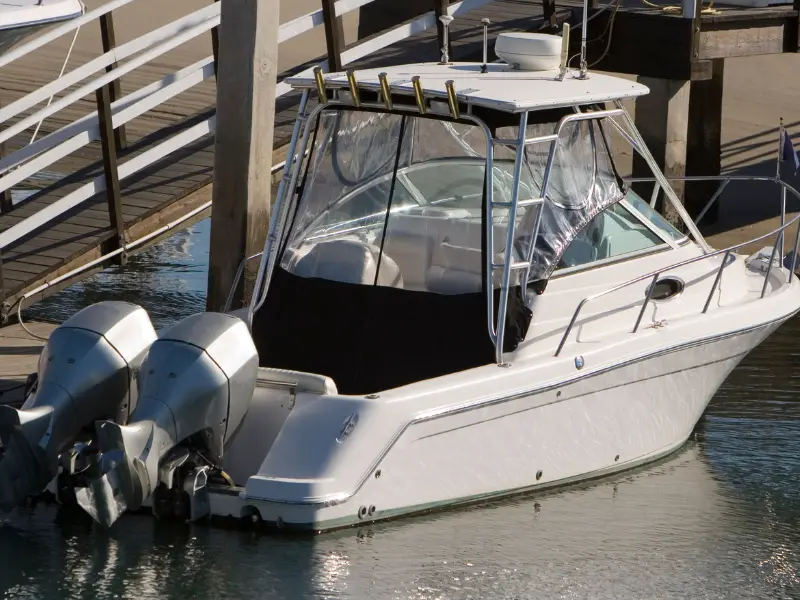There are many different types of fishing boats, and all of them come in different shapes and sizes. If you’re looking to buy a fishing boat, it can be challenging to figure out what type of boat is the best for you and your vehicle. Knowing the fishing boat’s weight is essential for safe towing.
So, how much does a fishing boat weigh? The average weight of a fishing boat with equipment, trailer, and motor is around 3500 pounds. How much a fishing boat weighs depends on the type of boat and the material it’s made from. Factors like fuel, fishing gear, coolers, and other accessories also affect the boat’s weight.
Keep reading to learn the average weight of the most popular types of fishing boats, such as aluminum fishing boats, bass boats, kayaks, skiffs, and many more.
Recreational Fishing Boat Weight

To know your boat’s actual weight, you first need to understand the difference between wet and dry weight.
The boat’s dry weight is the mass reported by the manufacturer. This is only the vessel’s weight without a fishing boat trailer, fuel, engine, equipment, and passengers. Dry weight is always the absolute lightest the boat can weigh.
Wet weight includes the boat’s weight with an engine and fuel. The weight of passengers, fishing equipment, and trailer isn’t included in the boat’s wet weight.
The actual boat weight is the weight of a fully equipped boat plus the trailer weight. This includes a boat with a full engine, passengers, and all fishing gear and accessories.
Check out the average weights of the most popular types of fishing boats:
Jet Fishing Boat
The average weight of a jet fishing boat is 2,900 pounds, but they come in a range of weights depending on the make and model. This is a dry weight of a jet boat and doesn’t include gear, fuel, and trailer weight.
Most jet fishing boats are made of aluminum, which is why they are relatively light.
Bass Boat
On average, a bass boat with a trailer weighs between 2,400 and 2,600 pounds. The average weight of a bass boat without a trailer and fishing gear is around 1,500 pounds. You’ll need an SUV or a truck to tow a bass boat safely from home to your favorite fishing spot.
Jon Boat
Depending on the model, Jon boats weigh between 300 and 1,400 pounds, with an average being 650 pounds. A Jon boat is an excellent choice if you don’t have an SUV or a truck to tow a bigger boat.
There are different types of Jon boats, and depending on your needs, you can choose a standard-style Jon boat or one with a center console.
Canoe
You can always go fishing with a canoe if you don’t want to tow a trailer. Lighter canoes made from wood and plastic, on average, weigh 65 pounds. The heavier types of canoes made from aluminum or fiberglass usually weigh between 70 and 80 pounds.
Kayak
There are many different styles of kayaks, and the great thing about them is that they can be transported by car. Kayaks, on average, weigh 100 pounds but can weigh more or less, depending on the make and model. Towing a kayak is simple whether you own a car, truck, or SUV.
Aluminum Fishing Boat
Aluminum fishing boats are typically 16 feet long and weigh 300 to 500 pounds. These boats feature a flat or deep V bottom and use a small electric or gas engine. When using a small motor, the weight of an aluminum fishing boat increases to 650 pounds.
Pontoon Boat
A pontoon boat with two or three hulls weighs between 3,000 and 5,000 pounds. As you can imagine, only a truck or an SUV can pull such a heavy vessel. Make sure that your SUV is strong enough to tow so much weight because not all models can.
Skiff
A skiff is a small boat, usually under 20 feet long, suitable for tight fishing spots and shallow water. Skiffs generally weigh between 300 and 900 pounds and come with a small light motor.
Skiffs are made from light materials like aluminum and fiberglass and are easily moved through the water with a long pole. These small vessels are easy to tow using a car or a crossover.
Fiberglass Fishing Boat
A fiberglass boat is 16 to 20 feet long and, on average, weighs 1,500 to 2,500 pounds. Larger models of fiberglass fishing boats can weigh up to 2,900 pounds. Expect the boat weight to reach 5,000 pounds once you add an engine and a boat trailer.
Sailboat
Sailboats come in many sizes and can weigh from 120 to 36,000 pounds. Towing smaller models of sailboats can be done with a car or a crossover, but even trucks can’t tow huge sailboats weighing over 12,000 pounds.
Sailboats are divided into two groups, depending on their length. So-called day sailboats are generally 14 to 18 feet long and weigh 400 to 800 pounds, depending on the material they are made from.
Larger, 20 to 30 feet long sailboats are great for family cruises and usually weigh 4,000 to 8,000 pounds. Towing such a heavy vessel can prove challenging, even if you own a truck.
Conclusion
Fishing boats come in a wide range of different weights. The boat’s weight depends on the type of the boat and the materials it’s made from. Let’s not forget that factors like engine, fuel, fishing equipment, passengers, and the trailer can affect the boat’s actual weight.
Check the dry and wet weight when purchasing a boat to ensure your safety while on the water. Knowing how much a fishing boat weighs will also help you find a suitable trailer to tow it on your next fishing adventure.